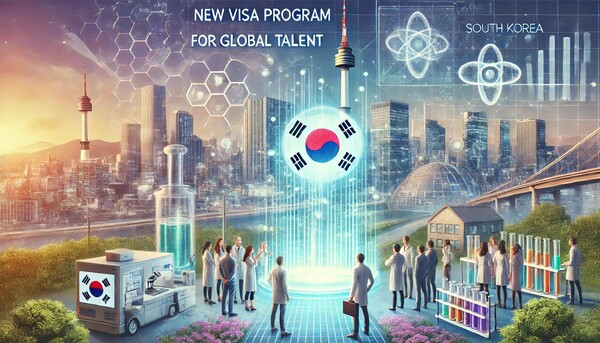The Korean government on Thursday announced the establishment of the "Top-Tier Visa" to attract highly skilled professionals in advanced industries, including biopharmaceutical, robot, display, semiconductor, and defense.

Korea introduces the ‘Top-Tier Visa’ to attract elite biotechnology and high-tech professionals, strengthening its position as a global innovation hub. (Generated using ChatGPT)
This initiative aims to position Korea as a hub for cutting-edge research and innovation by drawing top-tier experts in such fields.
On Wednesday, Acting President and Minister of Economy and Finance Choi Sang-mok presided over the 30th Foreign Policy Committee meeting at the Government Complex in Seoul. The committee discussed visa system improvements to promote economic growth and regional development, enhancements in social integration programs for immigrants, and the introduction of foreign caregivers. The government also reviewed the "2025 Foreign Policy Implementation Plan."
A key measure introduced in the meeting was the Top-Tier Visa, which is designed to attract world-class professionals in biotechnology and other cutting-edge industries.
The government expects that the new visa program, set to launch in March, will make Korea an attractive destination for top researchers and specialists in the biomedical field.
The Top-Tier Visa is available to individuals who hold a master’s or doctoral degree from one of the world’s top 100 universities and have at least eight years of work experience, including three or more years at one of the world's top 500 companies.
Applicants must expect an annual salary of at least three times Korea’s Gross National Income (GNI) per capita, approximately 140 million won ($97,215), and be employed by a Korean high-tech company.
Qualified professionals and their families, including spouses and minor children, will be granted an F-2 residence visa, allowing them to work freely and settle in Korea.
After three years, they will be eligible for permanent residency. The visa program will also offer expedited electronic processing for entry and residency permits, eliminating the need for visits to embassies or immigration offices. Also, beneficiaries will be allowed to invite their parents or helpers, further enhancing their quality of life in Korea.
The initiative is closely linked with the Ministry of Trade, Industry, and Energy’s “K-Tech Pass” program, which aims to support foreign professionals to settle in Korea more comfortably.
The program includes a 50 percent reduction in income tax for up to ten years, permission for their children to enroll in foreign schools beyond standard admission quotas, expansion of housing loan limits, and personalized assistance in financial services, telecommunications, and registration processes.
The government also plans to provide enhanced incentives for biotech experts by facilitating research funding opportunities, grants, and academic collaborations to strengthen Korea’s position as a leader in the global biotech sector.
To further encourage top-tier talent to settle in Korea, master’s or doctoral graduates from the world’s top 100 universities will be allowed to stay in the country for up to two years under a job-seeker (D-10) visa, even if they have not yet secured employment.
This measure particularly aims to attract young researchers and emerging professionals who can contribute to the country’s rapidly expanding advanced industries.
“The world has entered a full-scale competition to secure top talent in advanced industries,” Acting President Choi said. “Adapting to demographic and economic structural changes and revitalizing the economy and society makes utilizing foreign talent no longer an option but a necessity.”